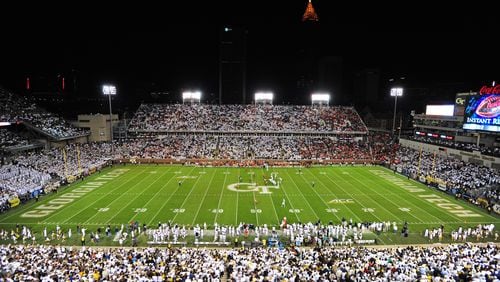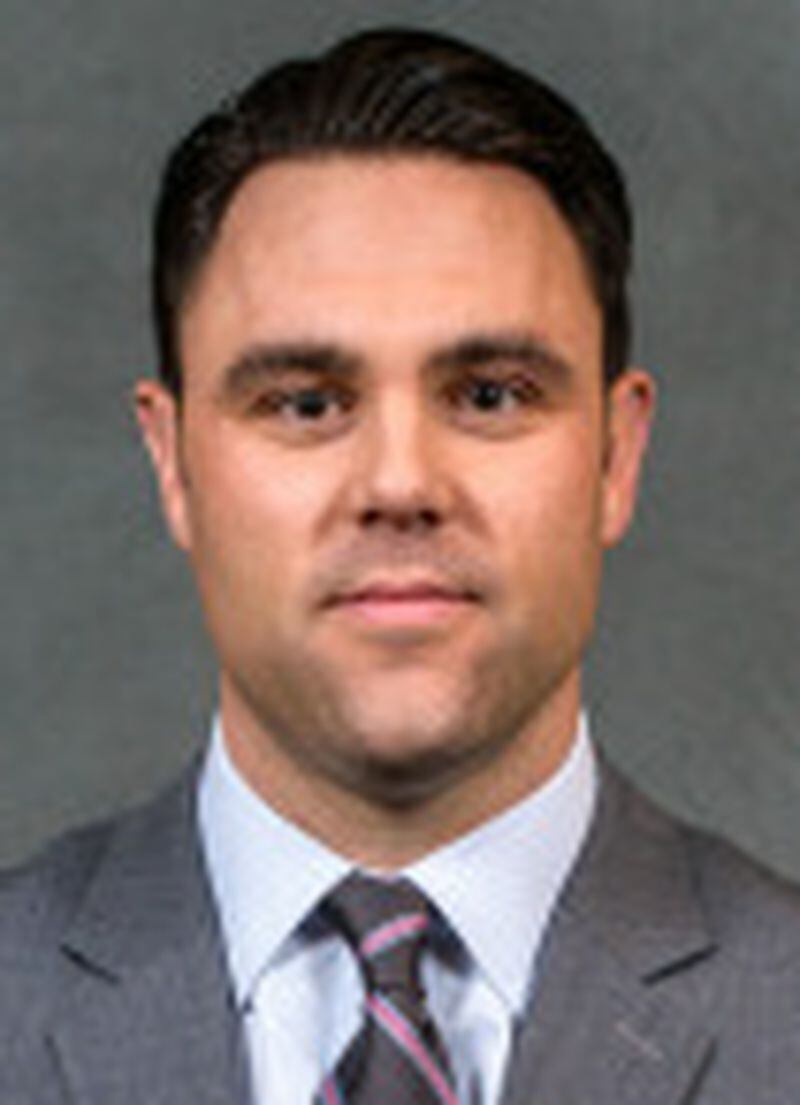Ryan Bamford's four-year tenure at Georgia Tech, first as associate athletic director to Dan Radakovich and later as senior associate AD to Mike Bobinski, ended in late April, leading to the AD job at Massachusetts, his first in the head chair. As he was primarily responsible for football scheduling at Tech, he and I spoke quite often and he became someone whose knowledge and insight into matters of Tech athletics I came to value. It has been easy to see him as a star on the rise, and his hire at Massachusetts, which is in the perilous position of trying to find a conference, confirms it. Prior to his departure, as he packed up his office overlooking Callaway Plaza, he shared thoughts about his time at Tech. Apologies for the delay. Some of the highlights:
On what he’s most proud of:
“I’m proud of the relationships I’ve built. I’m proud that, through two of our leaders, Dan Radakovich and then Mike (Bobinski), I’ve been able to help them in a leadership capacity on the leadership side and be a go-to for our coaches that I deal with on a daily basis. I’m proud of the success we’ve had in football, especially, in the last year. It takes a team effort, and I think we’ve done a good job together.
“And then I’m proud of some of the fan experience things we’ve done in game operations and facilities, some of the facilities we’ve built, some of the work we’ve done to provide a good experience for our fans.”
Something he would have liked to have gotten done:
“I’m proud of what we’ve done with the basketball program because I think we’ve come a long way in the four years that I’ve been here – and I came in the same week with Brian Gregory. My first week was actually when we interviewed him. For Brian, I wish we had been able to get some more victories and I think there’s reasons why (we didn't). I wish I was able to help him see some more success. I think that there’s a good foundation there.
“I’m proud of what we’ve done to build that foundation together , but I do wish that we had the opportunity to have a little bit more success in basketball, because Brian works hard and he’s got good kids in the program. It’s just, we’re so close. It’s just getting over that hump.”
On an important lesson or skill that he has acquired that he knows he’ll put to use:
“Patience. I’ve learned that from Mike. I think Mike’s got a great handle on how to read a culture, to make decisions outside of a vacuum, to understand all the things that go into it. How it fits, decisions we make and how we do things day to day fit into our philosophy as a department. I value that. I think it’s going to be important for me as I start my tenure as an AD to be patient and to make sure that, every day, I’m trying to add as much value to our program as I can.
What’s a way you saw him being patient in a decision or some sort of process?
“I don’t know if it’s something unique. I think it’s every day when he and I dealt with things in the last two years together. It’s just the thought process. At times, when I’ve wanted to move quickly on things, he’s very good about saying, ‘O.K., lay out all of our opportunities and options.’ And then sometimes saying, ‘O.K., let’s slow down for a second and understand how this affects the organization.’ I think that’s been really positive.”
What’s a near miss you had in scheduling?
“Well, I’ll tell you that there’s a couple of things that are still in the pipeline that I’m not going to be able to see through that I think are going to be pretty neat, and Georgia Tech will have to determine, Mike will have to determine if they’re things that we will do in the future, that I’ve kind of started the process on.
Credit: Ken Sugiura
Credit: Ken Sugiura
“Near miss? I think one of the things that I would have loved to have done, and I still think there’s an opportunity to, I really, really would have loved to have scheduled a football game or a series with Auburn. Not that that won’t happen, it just hasn’t happened in my four years. We haven’t been able to find a time to do it. I think Auburn wants to do it, I think we do, too, and I think our fans are pretty excited about that matchup. So to do a home-and-home with them would be something that I think would be kind of neat, just from a geographical standpoint.”
(Bamford had noted previously that there is a logistical challenge on both sides, in that Auburn wouldn’t want to play at Georgia and Tech in the same year, and Tech wouldn’t want to play at Georgia and at Auburn in the same year. But given that both Tech and Auburn play in Athens in even years – and host the Bulldogs in odd years – a home-and-home may be untenable. A neutral-site game, like the Chick-fil-A Kickoff game, might be the solution.)
What was a particularly crazy day?
“That was when we were trying to sign Presbyterian (as a football opponent) after we were asked by the ACC to play in the Labor Day game against Virginia Tech three years ago. Dan Radakovich was the AD and I could not find a Week Two FCS opponent to save my life. We had called everybody. I worked on that for a solid month and I must have made 500 phone calls or e-mails.”
“We wrapped, I think, one or two guaranteed basketball games. Brian Gregory, he understood. He was great about it, but sometimes you’ve got to leverage some of those things. So we ended up signing the deal, working with the ACC on it, so it was (then senior associate commissioner of the ACC) Michael Kelly, Dan, myself, obviously Paul Johnson and eventually Brian Gregory got involved because we needed to seal the deal. It wasn’t necessarily a day, it was probably a month of just heavy negotiations to try to, one, find a school, and then to negotiate the deal that got it done to make sure that we could play in that Labor Day game.”
Bamford said he kept the pen that Radakovich used to sign the contract.
“In fact, I had it up there (on a shelf) until last week, strangely enough. I took it down and threw it away as I was cleaning out. I didn’t need it anymore. It didn’t have any ink left in it. But Dan signed with the pen, I kept it for three years. That’s how crazy that month was. Those are the types of things that, when you’re in the moment, they’re not that fun because you’re just grinding and trying and you think you might have an opponent. We thought we had Florida A&M. I sent them a contract and they called me back two days later and said they took a game from Oklahoma for $200,000, or whatever it was. Then I had to go back to the drawing board and called all those other people and moved things around. It was not fun.”
Who is someone, or a few people, in the department that don’t get a lot of credit but who help make things go?
“A couple people come to mind. Chris Breen in academics. (Breen supervises academics for football.) He’s a very quiet individual. He has the respect of our coaches, especially Paul. He has the respect of our kids and our staff. He’s been a great colleague of mine to help me understand and work through some of the academic things and help our football program be successful. So Chris is definitely one of them.
“I think behind the scenes, (associate AD for compliance) Shoshanna Engel has really done a remarkable job from a compliance standpoint. In the four years, we’ve had four compliance people. I think it’s four. Three, at least, if not four. And she’s really steadied us. I think she’s gained the respect of our coaches and I think she’s really personable and our student-athletes really like her. She engages with them. That would be another one.
“We have a lot of people on the internal side that do a lot of really good work that get a lot of credit. (Assistant director of facilities and turf) Jon DeWitt gets a lot of credit and his staff does. I think there’s a lot of people in operations and facilities that do a lot of good work. We have a good organization and Mike’s built a good administrative team, but Chris and Shoshanna are two that come to mind.
How do you get UMass into a conference?
“The best thing we can do is look internally and make sure that we’re doing everything we can to be the best UMass athletic department that we can be. And I said this in my press conference (at UMass), we need to raise our profile in the Commonwealth, in the state of Massachusetts. And in order to do that, we’ve got to have some support externally. We’ve got to market ourselves better. We’ve got to plan our flag across the region. We’ve got to do well in sports that are recognizable, football, basketball, hockey, lacrosse.
“And if we do those things and get into Boston, which is the No. 6 media market in the country, and we raise our profile in Boston and we build a base of support there, we’ll put ourselves in a position to get into a league. (To look for a league to join first) is kind of the cart before the horse. You’ve got to build something that people believe in before you can even go to another conference and say, ‘Hey, we want to be part of your deal.’ And so I really believe we need to look inside the organization and figure out a way to make ourselves better, help raise the profile of the university, which is doing remarkable things on the research front and on the academic side.”








